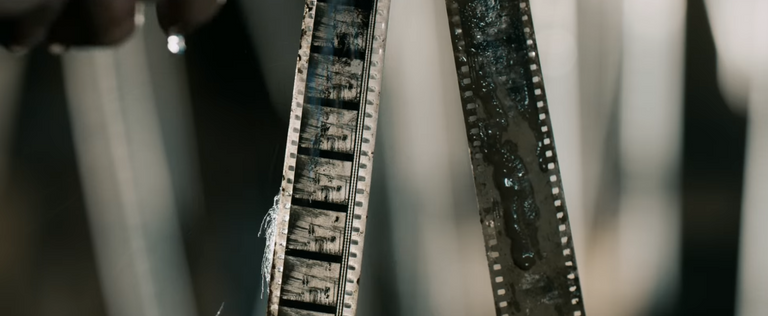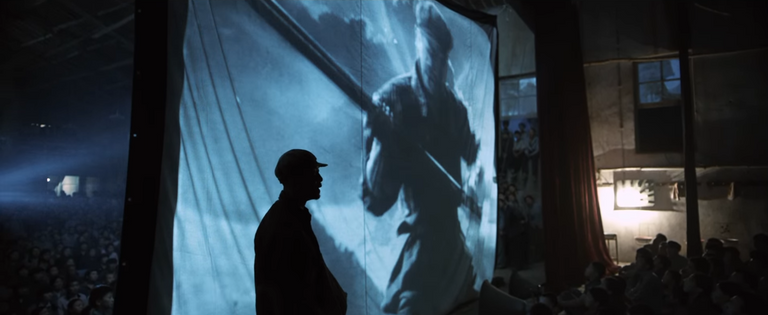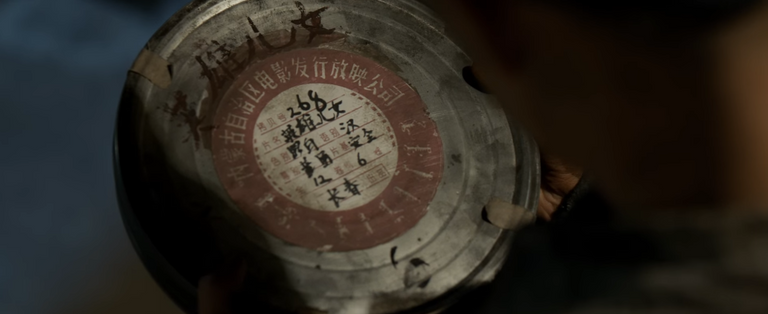'One Second' by Yi-Mou Zhang Review: Censorship, filmmaking, and preserving art

I had an email appear in my inbox the other day from Letterboxd that announced some type of partnership in which users of Letterboxd were eligible for a free 90 days of Mubi access. Mubi has been a streaming service I have enjoyed in the past but often felt falls flat in really offering much content to really justify the subscription cost each month. Though, that was in the past in its earlier days; I decided to give the free 90 days a chance, and discovered that Mubi has in fact really managed to grow and increase its library. Featuring documentaries, short films, and feature films from the past and present. Mubi is a special type of streaming service; one that aims to support independent filmmaking on a global scale. That means plenty of different types of creations from many different countries.
Even before Mubi I was quite reliant on international films and independent creations. They are mostly what I have been watching for the past few years for their ability to escape the western prison of profit over quality. Even going as far as watching films from countries where censorship of all things is often an issue. And in today's review, that is ultimately the focus. Featuring One Second, a film on the beauty of filmmaking, and how censorship has infiltrated both the production itself, and the industry over the decades to spread propaganda. Though there are underlying themes present in One Second that speak of a broader picture, despite the censorship struggles that have clearly resulted in a release that is a bit more politically correct in the Chinese government's eyes.
One Second is about the escapism through filmmaking. The love for it, and how one second of film can be enough to give someone hope, albeit even if that hope is given through propaganda and blatant brainwashing.

There are no doubts that the Chinese Community Party are an evil pile of filth, and Yi-Mou Zhang displays the ways in which the Chinese people are subject to a world of isolation and poverty as they seek escapsim through the idea of film, where their small towns are subject to occassional screenings of films that are nothing more than propaganda aimed at rallying up the people and brainwashing them into believing their worthless lives are in fact contributing to a greater good somehow. This is evident in the film's strong reliance on the screening of one of China's largest propaganda films: Heroic Sons and Daughters. A film that of course displays the struggles of the majority working class of China in a desperate bid to reject western ideology and promote the communist disease through the idea of triumph and success as a result. This is the frequent case of propaganda in totalitarian nations, where the threat is never-ending, and the idea of success and freedom is around the corner once the evil is defeated. Though the war never actually ends in reality, for otherwise that would result in a revolution in the people.
Beneath the elements of propaganda sits a regular narrative, however. One in which filmmaking and hardships bring people together. A nomadic male roaming China's wastelands following the movement of the film reels in efforts to catch a screening of it himself, though for a more personal reason: to mask the blatance of propaganda within the film itself, the government releases newsreels that detail the country's efforts and accomplishments as a collective, showing the hardwork going on elsewhere to encourage the people in each location; more propaganda essentially. Though our male sees through this aspect, and is desperate to catch a screening of the newsreel due to his daughter supposedly being within it. The narrative unrolls and displays the realisation that our main protagonist is a supposed criminal that broke free from a labour camp to witness this screening of his daughter that he cannot see in person.
The film reels become damaged due to typical Chinese accidents during travel, meaning the reels became exposed to the grit of the nonexistent paths and roads, covered in dirt and dust. If you know much about film rolls, well, they're very fragile even once developed. What ensues throughout the film is a community effort of restoration, paying homage to cinema and displaying the importance of preservation within film; something of course that counters the Chinese Communist Party's interests as many films throughout recent years have seen either entire removal from circulation or large amounts of editing and censorship to adhere to their modern interests. Hiding in plain sight is a narrative on the connection and empathy that comes from filmmaking and the love for cinema; the importance it plays on our lives and how we treat each other.
The film displays the lack of empathy often found within current China, where people are quick to sell each other out for bonus points from their leaders, whether it results in one better meal or maintaining a job. We see the present cruelty from one person to the next despite the communist ideology in which people are supposedly one, and that they should stand next to each other. Of course the result in which people are all struggling to survive means heavy competition where the self is forever considered over the next person. The film toys with this idea through different characters of varying ages, seeing the cruelty inflincted on each other through the government, but also displaying how cinema works as a method of bringing such people together in the end -- though of course in the case of Yi-Mou Zhang's 'One Second', that is unfortunately more propaganda that turns them into these cruel slaves.

It is more difficult than ever before to get an independent film released from within China, particularly due to the Covid issues that the country still clings to and desperately lies about in order to maintain more control over people in such strange economic times. Many of their releases continue to be blatant propaganda aimed at maintaining the support of the people, or at least lying to them to make them believe their hardships are for a good cause and not just funding a government's control over them as they themselves live in luxury.
One Second, while still being very politically safe, still tries to sneak in a few messages here and there that detail the country's downfall and sad reliance on its government, but also displays the ways in which cinema provides an escape. It shows us the importance of preserving creations and not forgetting them. Our protagonist quite literally chases down film, longing to watch it and escape from his reality at any cost. The people present within the small town each long to view a screening of a film together, where it becomes a town goal to restore something perhaps very damaged. The idea of a cinema being a place of peace, community, and a moment that provides freedom from the hard lives they live. Where society's issues may result in conflict between them, but inside the theatre there is nothing.
One Second is a film about the love for filmmaking, and the connections it provides to us all, but attempting to seep through a barrier that aims to destroy it and control it at all costs. It is hard to say I even liked the film for such reasons; knowing what it wanted to do, and seeing what it had to become in order to attempt saying it rather than being capable of flourishing. It remains cinematic, dreamlike in parts, seeing the characters in constant motion over film reels. Desperate for just one second of viewing.
Though, if you are to watch this film, it is very easy to overlook the attempts to reveal a greater picture, and instead fall victim to the near praising of communist ideology and the excitement for the very thing that enslaves the people.

Nice and interesting story line. Thanks for the awesome review. That will be a good watch for the weekend.
Check out Mubi if you have a Letterboxd account. That same deal of 90 days free might be available to you and others too!
Yes I do. Sure I will check it out.
Many thanks
Amazing movie review, it's an interesting one, thanks for sharing
Have you ever seen any other work of Zhang Yimou? His older work, I mean ( from the 80s )? Perhaps you talked about that here, I merely scanned through this post as my focus isn't great these days ( my dad passed away on Wednesday ).
This title sure sounds interesting and this filmmaker's work usually intrigues me.
And thank you for reminding me of MUBI. I paused my subscription a while ago and had forgotten about this service but am fed up with Netflix and the majority of its content.
Less content ( and crap ) to sift through and higher quality, more arthouse, world cinema, is exactly what I need.
I'm sorry to hear about your dad. I don't think you'd do it but make sure you don't isolate too much, it'll make it harder. Feel free to reach out on Discord if you want to talk stuff too.
I don't think I have, but he's definitely on my radar now. I'll watch his older stuff over the next few weeks, I think.
It has really improved, there's a lot more on there, and it is good. I noticed they had a few shorts and documentaries too. Check out the Oslo Trilogy if you haven't, each film is on there.
Take care for now. Don't force things but remember to take care of yourself and keep yourself active.